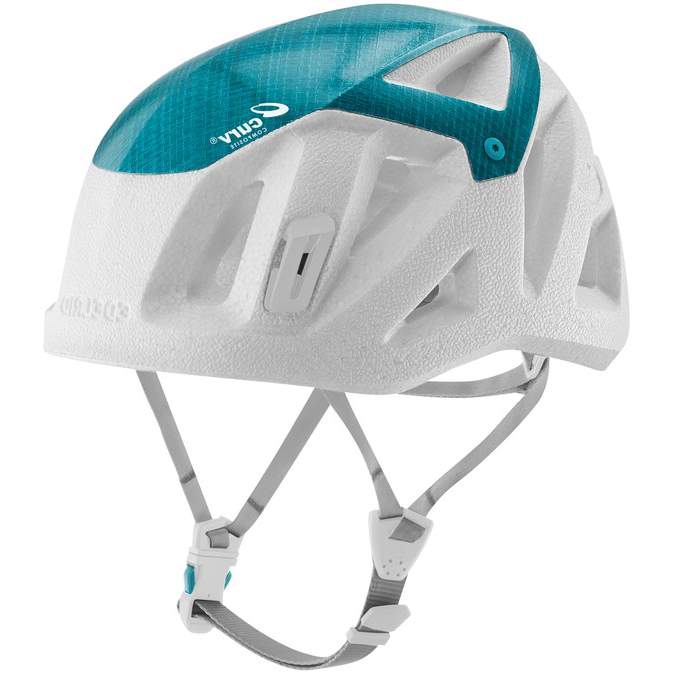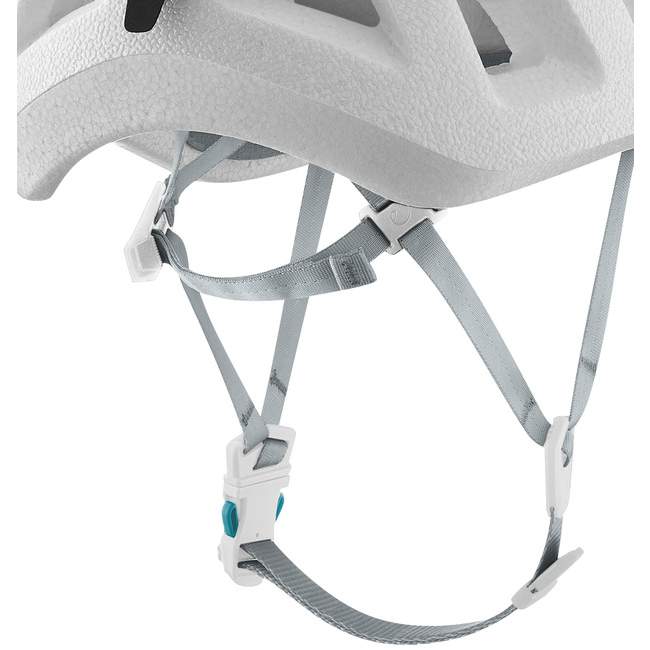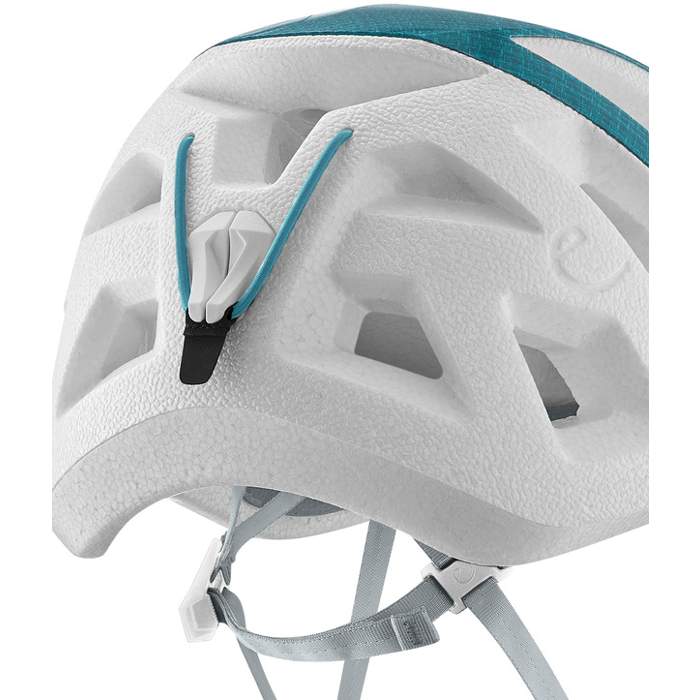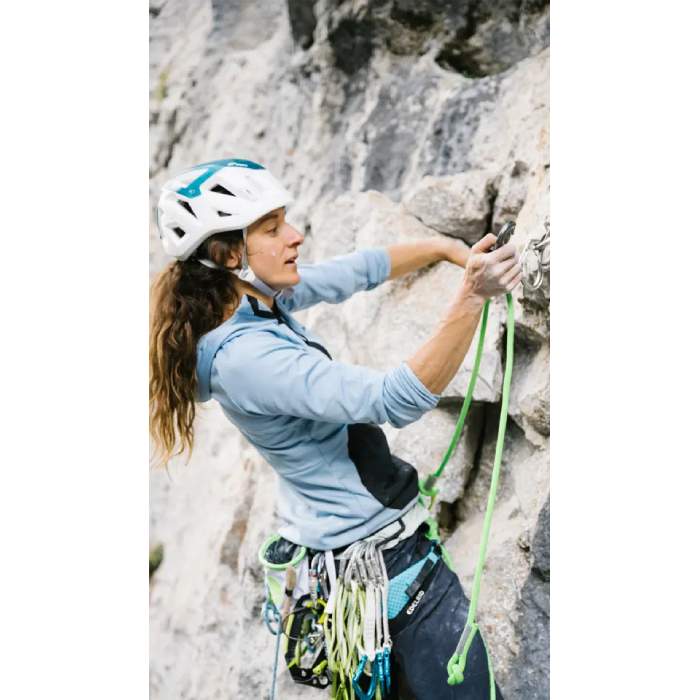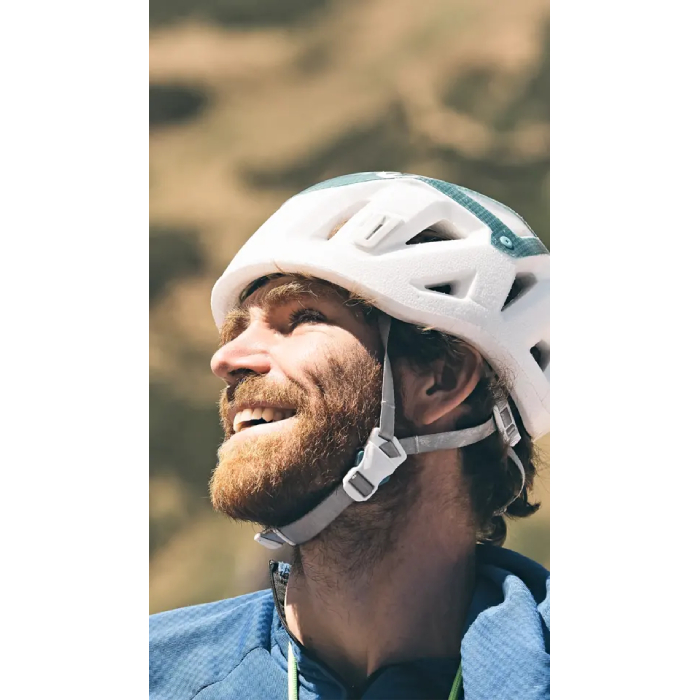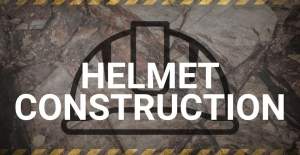How to use Edelrid Helmet, safety, lifespan, storage and care with instructional pictures.
Salathe Lite
Description
The SALATHE LITE is almost another 20% lighter than its big brother! We have achieved this weight reduction by replacing the classic ABS shell with Curv®, the latest generation of an extremely high performance, thermoplastic material. It has similar properties to fiber-reinforced composites like carbon: good rigidity, high tensile strength, and exceptional impact resistance—all with a very low weight.
- Fully adjustable chin strap with closure system under the ear for greater comfort
- Ultra-light EPP core (expanded polypropylene) for outstanding shock absorption and high dimensional stability
- Easily adjustable harness straps for a secure fit, minimal pack size, and excellent ventilation
- Headlamp attachment with 2 clips at the front and an elastic strap at the back
- Large vents ensure a constant supply of fresh air and heat dissipation
- The helmet shape is specially designed for use with ski goggles
- Ergonomically-shaped interior with removable, washable padding
- Side/front/back impact tested according to EN 12492
- Robust hard shell made from innovative, ultra-light Curv® material in the upper and front areas for additional protection e.g. in the event of rockfall
Retail price
When you click a link below and then checkout online, no matter what you buy (climbing gear or not), we get a small commission that helps us keep this site up-to-date. Thanks!
Weight (g)  Weight (g)In grams, the weight, as stated by the manufacturer/brand. If there are differences in weight (due to multiple size or optional accessories) we note those here. | 178 g Size 1: 178 g / 6.3 oz |
Gender  GenderThis is the gender as stated by the manufacturer/brand. We use the term "Men" and "Unisex" interchangeably, as there is no difference between these types of helmets. |
Unisex |
Size Range  Size RangeThe sizing options of the helmet according to the manufacturer. | 19.60 in - 24.40 in Size 1: 50-58 cm / 19.6-22.8 in |
Features  FeaturesBike Cert (EN 1078)The EN certification for helmets used for bicycling and skating. The major difference in testing 1078 involves needs for more head coverage and for the helmet to pass a deflection or 'roll-off' test of the impact force. BrimHaving a brim on a helmet may be inconsequential to some climbers but they make a great additional bit of protection against sun, rain and falling debris like small rocks or verglass. Multiple SizesThis is helpful for those with particularly small or large heads because helmets that come in 2 or 3 sizes cover a broader range of head size. Usually these are denoted as size 1 or 2, though some brands have S/M and M/L. Face Shield CompatibleFace shields are a part of PPE that could be handy when drilling, developing and cleaning particularly dirty remote routes. Usually only used by work at height professionals. MIPS technologyMIPS or Multidirectional Impact Protection System is a technology designed to reduce the amount of impact force that makes it to the brain. This is accomplished by adding a low friction cap between the liner and the helmet, allowing the shell to deflect around the head rather than transfer the forces from impact directly to the wearer. Many bicycle helmets include this feature and it is starting to be applied to sports like skiing, motorcycling and climbing. Many MIPS helmets are also EN1078 compliant. Ponytail CutoutSo far these are only found in "women's" helmets. It's a cutout / notch area that accommodates a low hanging ponytail hairstyle. RECCO® reflectorThese are used in locating someone missing or buried in an avalanche and are becoming more common in climbing gear due to the increased popularity of ski mountaineering. Though they are more often sold as something to add onto the helmet than being built into one, some manufacturers have begun to build them in. Ski Cert (EN 1077)The EN certification for helmets used for climbing and skiing. This test is simpler than the EN/UIAA one performed for helmets in general, but increases the amount of force that a helmet must endure. Likely this to simulate the faster speeds involved with downhill skiing impacts versus rockfall or climber accidents. This cert becoming more common in helmets as SkiMo popularity increases and more climbers are adding backcountry skiing to their mountaineering repertoire. |
Multiple Sizes |
Quick Adjust  Quick AdjustQuick Adjust refers to the straps of the helmet. Do you want the ability to ability to "quickly" adjust the fit. This could be a dial, or other plastic pieces. Really, most climbers don't need to change the fit of the helmet often, unless you're climbing with and without hats, or you have big hair that flattens and then requires tightening after climbing for awhile. |
No |
Vents  VentsRefers to openings in the helmet body to allow air flow. Commonly found in most helmets these days, but often more so in foam and hybrid foam helmets than traditional hardshell polycarbonate shells. Learn More
Click here to read more on helmet construction |
Yes |
Headlamp Compatable  Headlamp CompatibleMany helmets include hooks or clips for holding a standard headlamp in place, which is quite useful for the caver or alpinist. Ask any climber who has been benighted and they’ll tell you just how useful this feature can be. |
Yes |
Face Shield Compatable  Face Shield CompatibleFace shields are a part of PPE that could be handy when drilling, developing and cleaning particularly dirty remote routes. This feature isn't very common in climbing helmets and usually only used by work at height professionals. |
No |
| Certification | EN |
No reviews yet.
EPP helmets don't tend to come cheap. The Salathe Lite's retail price of £110 is the same as the comparable Petzl Sirocco, but significantly cheaper than the BD Vapour. Lightweight, well-vented, and decent value: if the Salathe Lite fits your head then it'd be an excellent choice for all your climbing and mountaineering. Being so light may be an advantage for scrambling and winter walking, too. It's a helmet for pretty much anyone, in other words.
A pictoral representation of the UIAA-106 and EN-12492 standards for helmets.
The UIAA equipment standard provides a baseline for equipment performance in a test lab under controlled conditions on new equipment. Although these test conditions are relevant to the conditions encountered climbing, conditions encountered at the crags and the condition of the equipment are equally important. This recommendation from the UIAA member federation The British Mountaineering Council (BMC) provides vital equipment information that is NOT explicitly addressed in the standard, particularly failure modes of the equipment and recommendations for the use, inspection, maintenance, and retirement of equipment.

